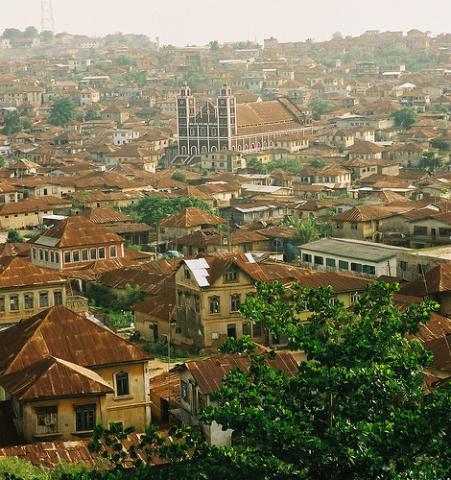
By Amaechi Nwosu
Nigeria in a solemn ceremony and amidst protest and anger finally handed over the complete authority of the disputed Bakassi Peninsula to Cameroon. The official handing over ceremony took place in Calabar, capital of Cross River State of Nigeria. The solemn ceremony was observed by delegates from the countries concerned, particularly Nigeria and Cameroun, the international community and states serving as witness.
The Camerounian delegation which signed the document of transfer of authority was led by the Minister Delegate in the Ministry of Justice, Maurice Kamto. Other members of the delegation included the Vice Prime Minister, Minister of Justice and Keeper of the Seals, Ahmadou Ali, and External Relations Minister, Henry Eyebe Ayissi, as well as some prominent figures of the Cameroon-Nigeria Mixed Commission.
The Nigerian delegation was composed of top government officials including high profile military personnel and the Nigerian Minister of Foreign Affairs, Ojo Maduekwe. The UN Secretary General, Ban ki-Moon, sent a message congratulating Cameroon and Nigerian on their incessant efforts in solving their dispute peacefully. Also, present at the ceremony were representatives of the four witness countries of the Greentree Accord; Germany, Great Britain, France and the United States of America.
The transfer of authority which took place in Calabar is a culmination of intensive diplomatic efforts undertaken to peacefully end the border crisis between Cameroon and Nigeria. One of the key elements to the peaceful resolution of the conflict includes the verdict of the International Court of Justice on 10th October 2002 ruling that the disputed region belongs to the Republic of Cameroon.
The most recent international diplomacy effort ended with the signing of the Green Tree Agreement on the June 12, 2006 signed by President Paul Biya of Cameroon, former Nigerian president, Chief Olusegun Obasanjo, under the auspices of former UN Secretary General, Kofi Annan, with four witness countries. The final handing over ceremony concretizes the Green Tree Accord thus bringing to a end a long story of land and maritime dispute between two neighbouring countries.
Nigerian military had earlier criticized Nigeria’s decision to handover the disputed peninsula, fueling suspicion that Nigeria may not abide by the decision to handover the territory as decided by the International Court of Justice ICJ. The military had said spoken about the security implications of the agreement.
The Senate Joint Ad Hoc Committee on the International Court of Justice (ICJ) judgment, which paved the way for the GTA, was told that the nation’s naval warships could only operate to a certain level in the Calabar Estuary following the treaty. Chief of Defence Staff (CDS), General Andrew Owoye Azazi, and the Director, Training, Nigerian Defence Headquarters, Commodore Dele Ezeoba, painted to the committee a picture of how the movement of the nation’s naval warships in and out of Calabar waterway would be encumbered if the relevant provisions of the GTA were not revisited. Azazi and Ezeoba had told the Senate committee that the provision of the GTA if allowed to pass would entail that Nigeria would have to write Cameroon for permission for her naval warships to move into Calabar waterway.
Specifically, Azazi told the committee that the former CDS, General Martin Luther Agwai, accompanied Obasanjo to New York where the GTA was signed, adding that there were no concrete documents on the input of the military in the agreement. He expressed concern about Article 4 (d) of the agreement which provides that Cameroon would exercise sovereignty on the waterway after five years, a development that will completely forbid the movement of Nigeria Naval warships through the waterway to Calabar except by official permission.
Azazi said: "The Boundary Commission talks about an agreement that was written in 1975 and we are talking about a document that was signed in 2006, which says our warships can only operate up to a certain level. "The estuary itself is about 12 nautical miles wide and how many of that are deep waters? We are saying that that from the boundary, what access could Nigerian ships have if you say Nigerian ships cannot ply on the Cameroonian side, with the level of deep waters? "It is of concern to us. If we cannot go through the deep waters, it means on the Nigerian side that is shallow, we cannot make any movement. I would like Commodore Ezeoba to make an explanation."
In his explanation, Ezeoba said: "The CDS has aptly described what the scenario is, but I will look at it from a professional point of view within the context of legal framework. "Under United Nations Conference on the Laws of the Sea (UNCLAWS 3) which clearly establishes territorial waters, contiguous zones and exclusive economic zones measured from the baseline seawards; from the arbitrary boundary that the DG of the National Boundary Commission has highlighted on the chart-from Akwaefo Rivers out to sea, it, kind of, divides the entrance to Calabar channel into two integral parts, ceding the right side of it to the east to the Cameroon and the west to Nigeria.

Leave Your Comments